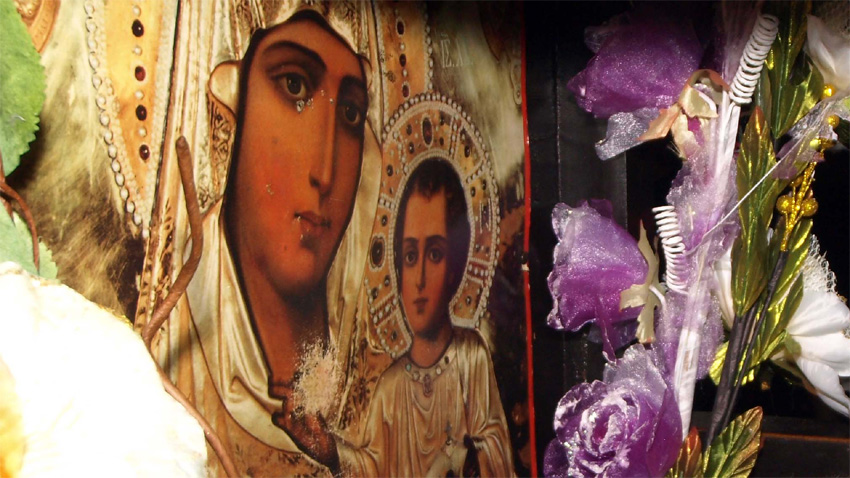The 15th of August is Assumption Day, a feast particularly venerated across the Bulgarian lands, connected with the Mother of God – patroness of childbirth, of motherhood and the giving of life. In towns and villages where there is a church or a monastery bearing the name of the Virgin, fetes are organized. Food is prepared with the meat of sacrificial animals and it is given out to the people who gather in the church yard. It is believed that every man woman and child must partake of this food for health; the women who honour Virgin Mary as patroness of motherhood shower her icon with flowers and gifts.
Assumption Day is a special day in the village of Ovchartsi near Dupnitsa. The 15th of August is the day when all villagers and many guests get together in the village. Kosta Katsarski is a man highly respected in Ovchartsi. In the 1960s he founded a group for authentic folklore, he has sung in the church choir and now passes everything he has learnt onto the younger generation.

“This is a day on which people from all over southwestern Bulgaria come to our village. Food is cooked as a votive offering – 30 cauldrons of it. This is a special day for us because it is a day to honour the Virgin Mary, the mother of Jesus Christ and he protects us in everything. Here, in Ovchartsi, there has been no hail, or anomalies, or drought in living memory. In winter we don’t get heavy snow or blizzards. People here believe they are protected. Preparations for the Day of the Assumption start on the previous day, when the food is prepared. On the 15th of August we begin the day with a church service. When it is over the church bell is rung and people gather at the chapel. Then there is a blessing of the water ceremony and the priest sprinkles the gathering with water for health. Then comes the time to make merry with songs and dancing. The festivities continue late into the night. People dance, sing and have a good time. This is an important feast day for the entire Christian world.”

They say that life in a village is boring. But people in Ovchartsi love their village because it is alive. “There are lots of young people, children, the houses are new and pretty,” says Kosta and adds:

“We have a really good time here, in the village, because people are fond of singing and dancing. We have lots of fetes and I take part in them all, despite my age. That is what keeps me going, I am fond of the place and of the people. Now we have a lot of work out in the fields, we used to grow tobacco, now it is wheat, in their gardens people grow peppers, tomatoes, beans, you can grow practically anything here. There are lots of fruit trees in our gardens, the land is fertile. Our folklore has a strong bond with the land, with tradition, with the way of life of our people and with many other things. That is why our songs are so diverse, and we pick out those of them that depict what life in these parts is like.”
English version: Milena Daynova
Photos: Gergana Mancheva, BGNES
Archaeologists have discovered a very rare and valuable glass bottle in a 2nd-century tomb in the southern necropolis of the Roman colony Deultum near the village of Debelt (Southeastern Bulgaria). What makes it unique is that it depicts the myth of..
The Days of Croatian Archaeological Heritage, which will last until 8 November, begin today at the National Archaeological Institute with Museum at the Bulgarian Academy of Sciences (NAIM-BAS) in Sofia. The event is organised by the Croatian Embassy in..
Today, 6 November, marks 104 years since the annexation of the Western Outlands in 1920. Traditionally Bulgarian territories in south-eastern Serbia and northern Macedonia were ceded to the Kingdom of Serbs, Croats and Slovenes in 1920 as a result of..
Today, the Bulgarian Orthodox Church commemorates St. Naum of Ohrid. Naum was a medieval Bulgarian scholar and writer. He was born around 830 and..

+359 2 9336 661
